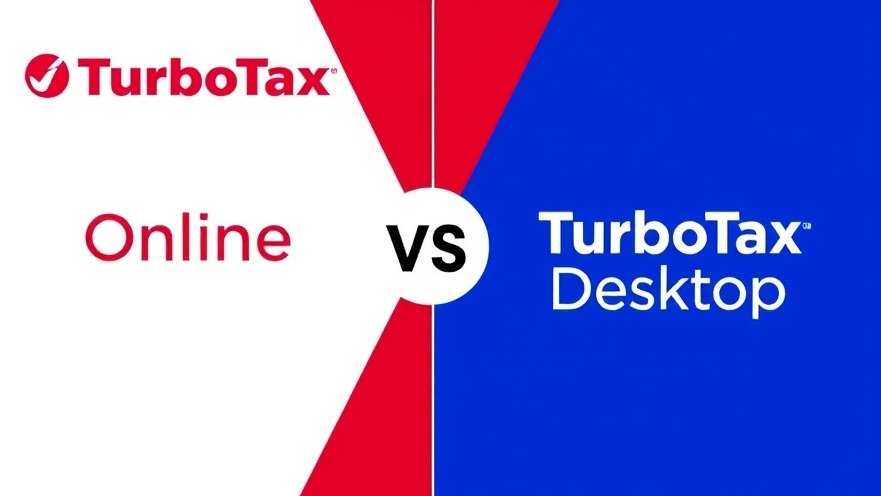
Understanding Your Options: TurboTax Online vs Desktop
For small business owners, the choice between TurboTax Online and TurboTax Desktop can significantly impact how efficiently your tax preparation process runs. TurboTax Online is tailored for those requiring a full-service tax preparation experience, often ideal for busy entrepreneurs who appreciate having tax experts at their fingertips. On the other hand, TurboTax Desktop caters to businesses that prefer to maintain control of their financial reporting and workflows, particularly S-Corps and partnerships.
Why Choose TurboTax Online?
TurboTax Online is designed for users who value convenience and expert assistance. This version allows you to access your tax files from anywhere with an internet connection—a crucial feature for those frequently on the move. The pricing structure, ranging from $0 to $129, provides an economical solution for small business owners while delivering reliable service.
The standout feature of TurboTax Online is the interactive support from tax professionals. Users can access real-time assistance, making it a reassuring option for individuals with complex tax situations. With TurboTax Online, you also benefit from automated updates and document organization, ensuring that you never miss a deadline or necessary paperwork.
Why Opt for TurboTax Desktop?
Conversely, TurboTax Desktop requires installation on a computer, but it offers more depth in functionality, particularly for those familiar with tax preparation. Ranging from $50 to $190, this option is generally more suited for business owners who want detailed control over their filing processes. Its ability to import data from QuickBooks is a significant advantage for many, allowing for easier financial integration and reporting.
This desktop version is particularly appealing for S-Corps and partnerships, as it provides comprehensive coverage of intricate tax details often required in these situations. It promotes a detailed hands-on approach, allowing DIY enthusiasts to delve deeper into their tax scenarios, ensuring every potential deduction is explored.
Side-by-Side Comparison: Key Features
To make the comparison clearer, we’ve gathered a head-to-head contrast of both TurboTax versions:
Accessibility: TurboTax Online is cloud-based, which is suitable for on-the-go access.
TurboTax Desktop is installed locally, necessitating specific hardware and setup.Pricing: TurboTax Online ranges from $0 to $129 while TurboTax Desktop ranges from $50 to $190.
Customer Support: Online users have immediate access to tax experts, enhancing peace of mind during tax season. In contrast, Desktop users rely on community support and self-guided troubleshooting.
Practical Tips for Making Your Decision
When deciding on the best TurboTax version for your business needs, consider the following:
Evaluate the complexity of your tax situation. If you have multiple income sources or deductions, professional support might be more beneficial.
Consider how often you file taxes and your preferred filing method. If convenience is critical, the Online version may be ideal.
Assess your comfort level with technology. Those who are tech-savvy may prefer the detailed controls provided by the Desktop version.
Looking Ahead: The Future of Tax Preparation Tools
Both TurboTax Online and Desktop are continually adapting to regulatory changes and user feedback. Expect to see advancements in AI automation, which will allow more predictive assistance in tax preparation. As tax laws become increasingly complex, future versions may offer enhanced analytic capabilities to guide users through evolving regulations.
Call to Action: Maximize Your Tax Benefits
Understanding the differences between TurboTax Online and Desktop allows you to choose the best solution for your tax needs. By evaluating your specific financial situation and preferences, you can confidently decide which version aligns best with your business's goals. Don’t wait until tax season; take action now and streamline your tax preparation process for greater financial success!
 Add Row
Add Row  Add
Add 




Write A Comment